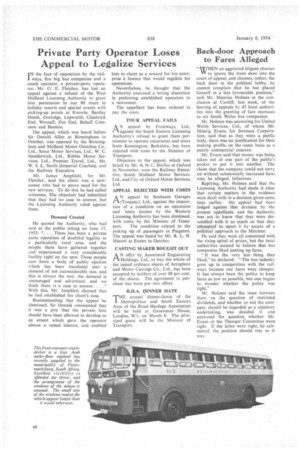Back-door Approach to Fares "Alleged
Page 42

If you've noticed an error in this article please click here to report it so we can fix it.
"WHEN an aggrieved litigant chooses VI' to ignore the front door into the court of appeal, and chooses, rather, the back door in the political lobby, he cannot complain that he has placed himself in a less favourable position," said Mr. Maurice Holmes at the conclusion at Cardiff, last week, of the hearing of appeals by 43 local authorities into the granting of fare increases to six South Wales bus companies.
Mr. Holmes was answering for United Welsh Services. Ltd., of whom Mr. Meurig Evans, for Swansea Corporation, said that as they were a public body, there was no justification for their making profits on the same basis as a purely commercial concern.
Mr. Evans said that money was being taken out of one part of the public's pocket to put it into another. The claim that the company could not carry on without substantially increased fares was, he alleged, fallacious.
Replying, Mr. Holmes said that the Licensing Authority had made it clear that certain matters in the evidence were dealt with in a decision given sonic time earlier. No appeal had been lodged against that decision by the present appellants, and the Authority was not to know that they were dissatisfied with it so much so that they attempted to upset it by means of a political approach to the Minister.
He said they were all concerned with the rising spiral of prices, but the local authorities seemed to believe that bus companies liked putting up fares.
"It was the very last thing they liked," he declared. "The bus industry grew up in competition with the railways because our fares were cheaper. It has always been the policy to keep fares as low as possible, but one begins to wonder whether the policy was right."
Mr. Holmes said the issue between them on the question of restricted dividends, and whether or not the company should be regarded as a statutory undertaking, was decided if one answered the question whether Mr. Evans or the Thesiger Committee were right. If the latter were right, he submitted, the position should stay as it was.




































































































